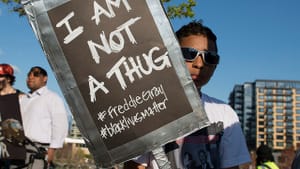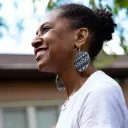Stay in the Loop
BSR publishes on a weekly schedule, with an email newsletter every Wednesday and Thursday morning. There’s no paywall, and subscribing is always free.
Turning despair to hope
The Sandtown-Winchester protests in Baltimore

When Iggy Azalea sings about trashing the hotel, she is being “fancy.” When a kid from Sandtown, Baltimore, trashes a liquor store, he is being a thug. When young people from the University of Maryland burn cars after their team wins, they are getting a bit rowdy. When young people from Sandtown burn a car, they are thugs.
I justify none of these things: Neither celebrity, celebration, nor rage is a good reason to burn someone else's property. Years of abuse don't make it okay to loot a store any more than years of rising up the ranks in Wall Street make it okay to loot the economy.
I have too much respect for the potential of the young people stuck in Sandtown to suggest that their only recourse is to steal and destroy, though I recognize that when we're enraged past our breaking point, our first reaction is generally irrational. But anger, even justified anger, can’t be used as an excuse for every action one takes, and the results, in this case, are injuring the victims of the original abuse — regardless of who owned it, the people who benefited from the CVS lived in the neighborhood, and that senior center was being built by a black church.
Expressions of power
The recent unrest in Baltimore is, in part, about power. Nations bomb other nations to demonstrate it, huge corporations fix and raise the prices of essentials because they have it, terrorists blow themselves up to exercise it, and hopeless young people in inner cities all over the world commit destructive acts to experience it, even briefly — as do young people who seem to have everything, since eating disorders and cutting are about control. The common thread among these expressions of power is the actors’ feelings of impunity — the kind of impunity that bad cops experience when other members of law enforcement cover for them. Nobody went to the wealthy parts of Baltimore to show frustration: Everyone knew it wouldn't be tolerated.
But if you've been pushed past the point of exploding what can you do when the match is lit except combust? One of my Facebook friends, a black man whose life is a remarkable story of perseverance, suggested that the ultimate act of civil disobedience for young, disenfranchised brown and black men is to love themselves. And in loving themselves, I'd like to add, they might end up loving each other.
There was a rumor that the three major street gangs were going to join forces on April 27 to battle the police. It never happened, but on the night of April 29, members of rival gangs joined forces to urge people to respect the curfew. What if these same groups joined forces to empower each other instead of killing each other? To clean up and build up the neighborhood around them? Impossible? Why?
First encounters
The onus doesn't rest solely on the people of Sandtown. A friend of mine, a white woman, was walking down the street in Lancaster the other day when a young black man approached from the other direction, wearing a shirt reading, “Don't judge me.” She stopped him and said she didn't judge him, in fact, she loved him because we're all God's children. Then she asked for permission to hug him, which he granted. He walked away with a spring in his step. She is extraordinary, and so, apparently, is he. Still, what would happen if more of us encountered each other with a smile instead of a look of distrust? Some people aren't trustworthy, it's true. But more might try a little harder to raise their standards of conduct if we treated each other like the same species more often.
Another example. A friend of mine, a black woman, used to work in a homeless shelter. She told the story of a young white man who was outside causing the sort of ruckus that made the people in the building consider calling the police. Instead, my friend felt led to approach him and ask his name. When she did, he crumpled to the ground, in tears. His brother had just been killed. Her compassionate response was all it took for his anger to return to its original roots — pain.
A final example. A white policeman in Harrisburg was recorded, clearly without his knowledge, playing basketball with a black boy. One good result was that the child’s milk-crate net was replaced with a real one after the video went viral. An even more important result, though, is that a new relationship began. Personal contact makes a difference.
More than smiles and hugs
My last piece for Broad Street Review was about the Recycled Orchestra, which was the subject of a documentary called Landfill Harmonic. I said that music won't solve every problem. I'll say something similar here — it will take more than smiles and hugs to make Sandtown-Winchester a neighborhood that inspires hope rather than despair. Filing charges against the six officers who arrested Freddie Gray for no particular reason is a start. But I hope that all of the media attention will result in concrete changes in the Sandtown-Winchesters that exist all over the country. A 16-year-old male resident of the area told Congressman Elijah Cummings that he felt he was “in a casket and can't get out.” Is this okay?
Lonnae O'Neal's excellent article on Sandtown suggests that this nation might be embarking on an “Urban Spring.” I hope so, but I also hope not, because we know how the Arab Spring turned out. I have no easy answers. As Jim Wallis says in his book, On God's Side, it will require a two-pronged approach: Personal responsibility for those who are currently trapped and community responsibility so that at least the casket will be ajar.
To read a related commentary by Dan Rottenberg, click here.
Sign up for our newsletter
All of the week's new articles, all in one place. Sign up for the free weekly BSR newsletters, and don't miss a conversation.

 Maria Thompson Corley
Maria Thompson Corley